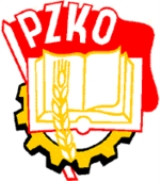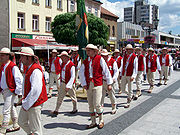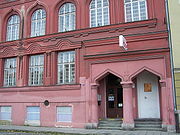
Polish Cultural and Educational Union
Encyclopedia


Czech Republic
The Czech Republic is a landlocked country in Central Europe. The country is bordered by Poland to the northeast, Slovakia to the east, Austria to the south, and Germany to the west and northwest....
. It represents the Polish minority in the Czech Republic
Polish minority in the Czech Republic
The Polish minority in the Czech Republic is a Polish national minority living mainly in the Zaolzie region of western Cieszyn Silesia. The Polish community is the only national minority in the Czech Republic that is linked to a specific geographical area. Zaolzie is located in the north-eastern...
together with the Congress of Poles
Congress of Poles in the Czech Republic
Kongres Polaków w Republice Czeskiej is a Polish organization in the Czech Republic. It fulfills two main tasks. It coordinates activities of other Polish organizations in the country, and represents Polish minority in negotiations with the Czech government...
. PZKO is the largest Polish organization with largest membership in the Czech Republic, although the number of members is decreasing as a result of demographic decline of the Polish community.
History
Before World War IIWorld War II
World War II, or the Second World War , was a global conflict lasting from 1939 to 1945, involving most of the world's nations—including all of the great powers—eventually forming two opposing military alliances: the Allies and the Axis...
there was a myriad of various Polish organizations. When PZKO organization was founded, in 1947, creating of other Polish organizations was prohibited. It was the only organization representing the Polish minority in the communist era, therefore it was under strong influence of the Communist Party
Communist Party of Czechoslovakia
The Communist Party of Czechoslovakia, in Czech and in Slovak: Komunistická strana Československa was a Communist and Marxist-Leninist political party in Czechoslovakia that existed between 1921 and 1992....
. PZKO gained monopolist position, and was responsible for all activities related to the Poles, as other Polish organizations have been banned. Eventually, PZKO became more under influence of the Communist Party, being incorporated by authorities into the communist National Front
National Front (Czechoslovakia)
The National Front was the coalition of parties which headed the re-established Czechoslovakian government from 1945 to 1948. During the Communist era in Czechoslovakia it was the vehicle for control of all political and social activity by the Communist Party of Czechoslovakia...
in the 1950s. During the 1960s, reformists began to have stronger voice, but after the Prague Spring
Prague Spring
The Prague Spring was a period of political liberalization in Czechoslovakia during the era of its domination by the Soviet Union after World War II...
of 1968, purges were conducted, and reformists were fired from their positions. Ernest Sembol, chairman of the General Committee of PZKO was also fired. The so-called Normalization Era had begun, and PZKO was under even stronger influence of the Communist authorities. After the Velvet Revolution
Velvet Revolution
The Velvet Revolution or Gentle Revolution was a non-violent revolution in Czechoslovakia that took place from November 17 – December 29, 1989...
, in 1990, PZKO exonerated people discriminated after 1968, including most noted personalities: Jan Rusnok, Henryk Jasiczek
Henryk Jasiczek
Henryk Jasiczek was a Polish journalist, poet, writer, and activist from the Zaolzie region. He is considered one of the most important Polish writers from Zaolzie after World War II and one of the most popular local Polish poets.Jasiczek was born in Kottingbrunn near Vienna, Austria as an...
, Wiesław Adam Berger, Tadeusz Siwek and Ernest Sembol.
Activities
The goals of PZKO are to promote and shield various cultural and educational activities of the Polish minority. PZKO organizes and supports many activities, including clubs (women's, senior's, youth's), lectures, concerts, excursions, dance, music and folklore groups, choirs, art groups, exhibitions, various sport and social activities etc. The largest and most famous event shielded by the organization, is the annual Gorolski ŚwiętoGorolski Swieto
Gorolski Święto is an annual international cultural and folklore festival held in Jablunkov , Czech Republic, the first weekend in August. It lasts from Friday to Sunday. It is organized by the Polish Cultural and Educational Union and the folklore group Gorol and preserves the traditions of the...
, in Jabłonków (Jablunkov), another large event organized by PZKO is Festiwal PZKO. PZKO also closely cooperates with Polish schools in Zaolzie
Zaolzie
Zaolzie is the Polish name for an area now in the Czech Republic which was disputed between interwar Poland and Czechoslovakia. The name means "lands beyond the Olza River"; it is also called Śląsk zaolziański, meaning "trans-Olza Silesia". Equivalent terms in other languages include Zaolší in...
, and with the Polish Scene (ensemble) of Cieszyn Theatre, in Czeski Cieszyn (Český Těšín).
For its activities PZKO was awarded several awards, including the Wojciech Korfanty
Wojciech Korfanty
Wojciech Korfanty , born Adalbert Korfanty, was a Polish nationalist activist, journalist and politician, serving as member of the German parliaments Reichstag and Prussian Landtag, and later on, in the Polish Sejm...
Award in 2001 for achievements and merits in preserving the Polishness of Silesia
Silesia
Silesia is a historical region of Central Europe located mostly in Poland, with smaller parts also in the Czech Republic, and Germany.Silesia is rich in mineral and natural resources, and includes several important industrial areas. Silesia's largest city and historical capital is Wrocław...
.
PZKO comprises local branches, called MKs (Miejscowe Koła) which exist in almost all municipalities and villages in Zaolzie
Zaolzie
Zaolzie is the Polish name for an area now in the Czech Republic which was disputed between interwar Poland and Czechoslovakia. The name means "lands beyond the Olza River"; it is also called Śląsk zaolziański, meaning "trans-Olza Silesia". Equivalent terms in other languages include Zaolší in...
. Most of these local branches have their own buildings, known as Domy PZKO (PZKO Houses), which serve as a place of various cultural and other events.
General Committee (Zarząd Główny) is housed in Český Těšín
Ceský Tešín
Český Těšín is a town in the Karviná District, Moravian-Silesian Region of the Czech Republic. The town is commonly known in the region as just Těšín . It lies on the west bank of the Olza River, in the heart of the historical region of Cieszyn Silesia...
(Czeski Cieszyn). Its current chairman is Jan Ryłko.
Statistics
| Year | Local branches | Members |
|---|---|---|
| 1947 | 79 | 7,296 |
| 1949 | 79 | 11,214 |
| 1952 | 80 | 13,046 |
| 1955 | - | 16,170 |
| 1960 | 92 | 17,780 |
| 1965 | 92 | 19,994 |
| 1967 | 92 | 20,656 |
| 1970 | 92 | 20,858 |
| 1975 | 94 | 23,449 |
| 1980 | 94 | 24,237 |
| 1985 | 95 | 23,701 |
| 1988 | 95 | 23,171 |
| 1990 | 95 | 23,070 |
| 1993 | 93 | 20,825 |
| 1995 | 92 | 20,200 |
| 1996 | 91 | 19,573 |
| 2007 | 84 | 12,300 |
Chairmen of the ZG (General Committee)
- Jan Pribula (1950–1951)
- Józef Kula (1951–1953)
- Karol Mrózek (1953–1955)
- Józef Mrózek (1955–1957)
- Adolf Kubeczka (1957–1959)
- Bogumił Goj (1959–1962)
- Eugeniusz Suchanek (1962–1968)
- Ernest Sembol (1968–1970)
- Jan Pribula (1970–1971)
- Eugeniusz Suchanek (1971–1975)
- Stanisław Kondziołka (1975–1987)
- Roman Suchanek (1987–1990)
- Władysław Młynek (1990–1993)
- Jerzy Czap (1993–1999)
- Zygmunt Stopa (1999–2009)
- Jan Ryłko (2009- )

